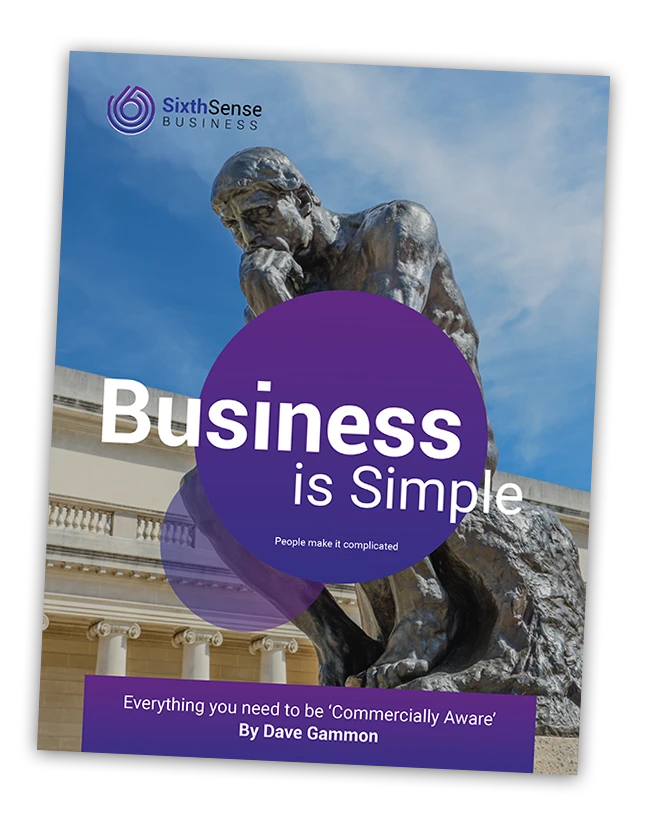
The purpose of this piece is to get us thinking differently about our companies and to access new perspectives by looking at what management consultants often refer to as the ‘helicopter view’.
You can only achieve a change in the outcomes you get and your experiences by shifting your perspective. As Einstein said, “You can’t solve a problem with the same level of thinking that created it”.
So, when you think about your company, what do you see? How would you describe it to me? Although there are plenty of other unique ways of characterising companies, some common answers I’ve heard are:
· a series of events, transactions, activities, and challenges you sequentially move through (a transactional perspective).
· a set of cash flows where money leaves and comes into the business (a financial perspective).
· a machine that converts orders into products/services (a process perspective).
· a group of people (the team perspective).
A helpful perspective for leaders is to look at your company as a participant in a game.
There are several characteristics of a good game:
· A board, court or field of play and a set of rules.
· A degree of unpredictability and adversity.
· An adversary and an outcome that determines who wins and loses.
The field of play.
In business, the field of play is the market we operate within (and the macro environment in which it sits). Ultimately the market dictates whether our company’s strategy is the right one and the speed we can travel in the direction we want to go.
The field of play presents a series of opportunities for us to move forward and challenges to overcome, many of which are not in our direct ability to control. We get to play on the field (and sometimes to influence how it works), but in the main, it is a constraint within which we operate.
One of the most exciting aspects of running a company in today’s environment is that the field of play is shifting and changing (arguably faster than ever) as economic, social, commercial, and technological forces reshape the field of play and the rules by which it is possible to compete.
When I worked at Tesco in the late ’80s, we could accurately predict the turnover of a million pound a week store to within a few thousand pounds. I wonder if that level of precision is still possible given the ever-shifting sands in the food retail sector?
Playing the game means that we must be constantly awake to these shifts and changes, ready at a moment’s notice to change our ideas, plans and activities to stay in the game.
Unpredictability and chaos.
The game of business is loaded with uncertainty and unpredictability. In many games, the unpredictable elements are primarily the moves made by our competitors. Many board games introduce unpredictability by introducing dice, rewards and penalties.
Could you imagine how boring a game would be without unpredictability and without having to overcome adversity to win?
When leading companies, we are required to move forward, to roll the dice in the face of uncertainty, to embrace and deal with setbacks and to keep playing until we have won the game. If you would have it any other way, then business leadership is probably not for you.
The outcome.
The goal of most games is relatively straightforward; to beat everyone else who is playing or to emerge at the end intact. But leading a company isn’t so black and white, and this may well be where the game metaphor begins to crumble a little.
Company leaders should be seeking to maximise the outcomes they attain for the efforts they put in, but what it means to win the game is uniquely defined by each of us and requires some compromise between personal and company outcomes.
It involves finding the right balance between many conflicting ideas:
· Profitability, quality, and customer service
· Employee job satisfaction, happiness, and efficiency
· Hard work and good lifestyle
Achieving clarity and alignment around a definition of success and a set of acceptable outcomes is a critical element of company leadership.
The call to adventure.
Of course, the actual leverage point in any game is the quality of us, the players. It is our attitudes, skill and knowledge that determine how well we play.
How we play the game is a matter of personal choice, although we need to challenge our sense of identity, core beliefs, and desired outcomes to ensure we are not selling ourselves short.
The more compelling our vision of ourselves and what we want for the company, the more we will be willing to face uncertainty, break out of our comfort zones and take challenges head-on.
We need to:
· Be clear on our desired outcomes (the criteria by which we can say we have won) and our strategy for engaging in and playing the game.
· Understand the rules by which the game is played so that we can keep within the lines.
· Use the underlying principles of good business to forge high-quality ideas, make decisions and set action priorities.
· Keep a clear eye on the score, so we know when to surge and when to coast.
· Monitor the performance stats that can predict our results and reveal where we need to improve or change.
· Ensure our team(s) are executing the game strategy we have set out and are best organised to deliver the win.
Most importantly, we must continually check ourselves and ensure we are well-calibrated to perceive what is happening in the game and give ourselves the broadest range of potential responses to the opportunities and challenges that emerge during play.
Coaching footnote.
One of the ways I help my clients create breakthroughs is to use metaphors. In this case, you can see that the game is a good metaphor for running a company as it allows for a holistic look at business whilst also highlighting some of the gaps in thinking that I frequently see in leaders.
Metaphors trigger learning and transformation at a deeper level than strategies or tactics because they can effortlessly shift deeply held beliefs without implying criticism. For this very reason, I suggest my clients read/watch/study a wide range of subjects and stories, instead of a whole bunch of dull business and self-development ideas.
